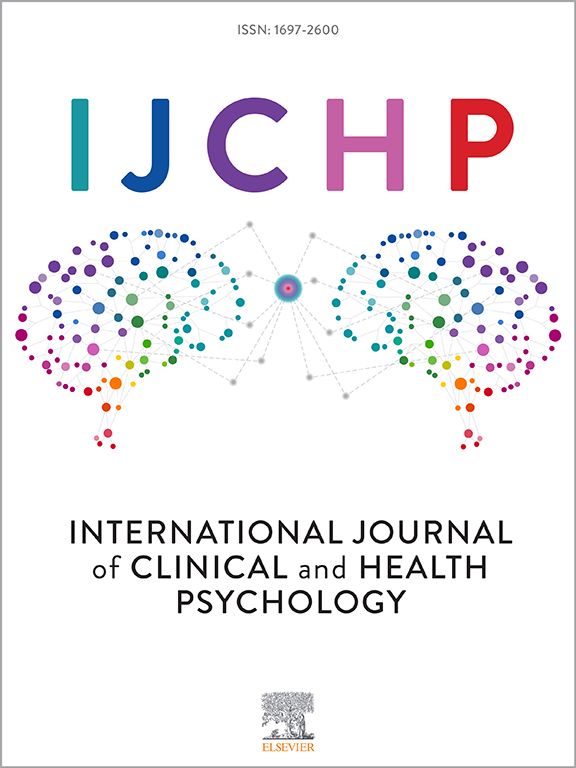Does Cognitive Stimulation Therapy show similar efficacy in individuals with mild-to-moderate dementia from varying etiologies? An examination comparing its effectiveness in Alzheimer's disease and vascular dementia
IF 5.3
1区 心理学
Q1 PSYCHOLOGY, CLINICAL
International Journal of Clinical and Health Psychology
Pub Date : 2024-10-01
DOI:10.1016/j.ijchp.2024.100510
引用次数: 0
Abstract
Objective
The effectiveness of the Cognitive Stimulation Therapy (CST) is well-documented. Nevertheless, the question of whether specific subgroups of individuals with dementia are more or less likely to benefit from this cognitive stimulation intervention remains unaddressed. Here, we directly compared the effectiveness of the Italian CST (CST-IT), delivered in a previous multicenter controlled clinical trial, across two distinct cohorts of individuals clinically diagnosed with Alzheimer's Disease (AD, N = 30) and vascular dementia (VaD, N = 27) in the mild-to-moderate stage.
Method
The impact of dementia subtype (AD vs VaD) on immediate (at intervention completion) benefits of CST-IT in general cognitive functioning, communicative abilities, mood, behavior and perceived quality of life was evaluated through linear mixed effects models. The frequency and severity of neuropsychiatric symptoms at baseline was inserted as a covariate due to the different behavioral profile in the two groups. Exploratory analyses also investigated the potential differential effect of dementia subtype on long-term benefits (three months after intervention).
Results
The CST-IT determined comparable immediate, clinically significant improvements in general cognition and communicative abilities. Dementia subtype influenced short-term benefits in depressive symptoms (with a greater decrease in AD patients) and quality of life (no significant impact in AD, and a small improvement in VaD). Such effects depended on diagnosis-related differences in neuropsychiatric symptoms. At long-term, benefits persisted in general cognition (though depending on the outcome considered). Improvements in narratives were seen in VaD, whereas communicative abilities in AD returned to baseline. Post-intervention gains in depressive symptoms persisted in AD, but not in VaD, although benefits in quality of life remained stable in the latter.
Conclusions
Different mechanisms of neuropsychological change after CST-IT were hypothesized for the different forms of dementia, particularly with respect to crucial outcomes such as language, mood and quality of life, with implications toward the delivery of such psychosocial intervention in clinical contexts.
认知刺激疗法对不同病因导致的轻度至中度痴呆症患者是否具有相似的疗效?比较认知刺激疗法对阿尔茨海默病和血管性痴呆症的疗效
目的认知刺激疗法(CST)的有效性已得到充分证实。然而,特定痴呆症患者亚群是否更容易或更不容易从这种认知刺激干预中获益的问题仍未得到解决。在此,我们直接比较了意大利认知刺激疗法(CST-IT)的有效性,该疗法是在之前的一项多中心对照临床试验中,针对临床诊断为阿尔茨海默病(AD,N = 30)和血管性痴呆(VaD,N = 27)轻度至中度阶段的两个不同人群实施的。方法通过线性混合效应模型评估痴呆亚型(阿尔茨海默病与血管性痴呆)对 CST-IT 在一般认知功能、交流能力、情绪、行为和生活质量感知方面的即时(干预完成时)益处的影响。由于两组患者的行为特征不同,因此将基线时神经精神症状的频率和严重程度作为协变量。探索性分析还调查了痴呆亚型对长期获益(干预三个月后)的潜在不同影响。痴呆症亚型影响了抑郁症状(注意力缺失症患者的抑郁症状下降幅度更大)和生活质量(注意力缺失症患者的生活质量没有明显改善,而失智症患者的生活质量略有改善)方面的短期疗效。这种影响取决于神经精神症状的诊断相关差异。从长期来看,一般认知方面的益处依然存在(但取决于所考虑的结果)。VaD患者的叙述能力有所改善,而AD患者的交流能力则恢复到基线水平。结论:针对不同形式的痴呆症,特别是在语言、情绪和生活质量等关键结果方面,我们假设了CST-IT治疗后神经心理学变化的不同机制,这对在临床环境中提供此类社会心理干预具有重要意义。
本文章由计算机程序翻译,如有差异,请以英文原文为准。
求助全文
约1分钟内获得全文
求助全文
来源期刊

International Journal of Clinical and Health Psychology
PSYCHOLOGY, CLINICAL-
CiteScore
10.70
自引率
5.70%
发文量
38
审稿时长
33 days
期刊介绍:
The International Journal of Clinical and Health Psychology is dedicated to publishing manuscripts with a strong emphasis on both basic and applied research, encompassing experimental, clinical, and theoretical contributions that advance the fields of Clinical and Health Psychology. With a focus on four core domains—clinical psychology and psychotherapy, psychopathology, health psychology, and clinical neurosciences—the IJCHP seeks to provide a comprehensive platform for scholarly discourse and innovation. The journal accepts Original Articles (empirical studies) and Review Articles. Manuscripts submitted to IJCHP should be original and not previously published or under consideration elsewhere. All signing authors must unanimously agree on the submitted version of the manuscript. By submitting their work, authors agree to transfer their copyrights to the Journal for the duration of the editorial process.
 求助内容:
求助内容: 应助结果提醒方式:
应助结果提醒方式:


